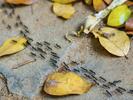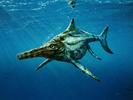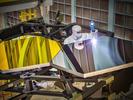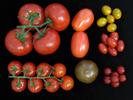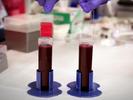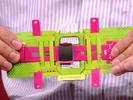Joe Palca appears in the following:
On The Ant Highway, There's Never A Backup
Monday, January 26, 2015
A team of Indian physicists has made a mathematical model that purports to explain why ants don't have traffic jams. NPR's Joe Palca explains as part of his series, Joe's Big Idea.
Why Ants Handle Traffic Better Than You Do
Monday, January 19, 2015
Ants don't show road rage. In fact, some research shows they rarely get into traffic jams, able to maintain a steady speed even as their numbers swell. Can physics explain it?
Ancient Scottish Sea Reptile Not 'Nessie,' But Just As Cute
Sunday, January 11, 2015
It was 15 feet long, with a snout shaped like a dolphin's. This newly identified meat-eater swam the seas near the Isle of Skye in the time of dinosaurs.
Scientists Bring The Sun Down To Earth To Learn How It Works
Tuesday, December 30, 2014
Using a giant pulsed powered machine in New Mexico, researchers have recreated the conditions inside the Sun, and their results help reconcile theoretical models with how the Sun behaves.
Do Fish Have Fingers?
Friday, December 26, 2014
Of course they don't, but they do have the genetic machinery to make fingers — something that shows how similar fish are to modern mammals.
Could Glitter Help Solve NASA's Giant Telescope Problem?
Tuesday, December 23, 2014
NASA's next big space telescope costs $8 billion and is very heavy. New York scientists think they may have found the makings of a cheaper, lighter answer for future space scopes — in a crafts store.
Russia Could Be On Brink Of Full-Blown Currency Crisis
Tuesday, December 16, 2014
The Russian ruble continued to drop in value against the U.S. dollar and the Euro on Tuesday — but the impact of its calamitous decline has yet to be seen on the streets of Moscow.
Methane Bursts On Mars Could Hint At Previous Life
Tuesday, December 16, 2014
Scientists have seen mysterious bursts of methane in the Martian atmosphere, and they can't rule out the possibility that the methane was made by something that was once alive on Mars.
Why Some Scientific Collaborations Are More Beneficial Than Others
Monday, December 15, 2014
It turns out that when scientists collaborate internationally, they are more like to have an impact on science than purely domestic collaborations.
To Search For A New Supernova, Build A New Camera
Thursday, December 04, 2014
Most telescope cameras can only capture a small patch of sky at a time. But a new camera has a much larger field of view, and its backers are hoping for help in deciphering its reams of data.
Africa Inspires A Health Care Experiment In New York
Monday, November 24, 2014
Dr. Prabhjot Singh lives and works in Harlem, a neighborhood plagued by chronic disease. He thinks an African model of health care can help — training people in the community to be health educators.
A Non-GMO Way To Get More, Tastier Tomatoes
Monday, November 03, 2014
People who grow tomatoes want varieties that produce as much saleable crop as possible. People who eat tomatoes are less interested in yield, and more in taste. The tension between taste and yield can get pretty intense. What's a poor tomato plant to do?
Enter Zach Lippman, a plant ...
Look Here: Phone App Checks Photos For Eye Disease
Friday, October 31, 2014
Bryan Shaw showed it was possible to detect early signs of eye cancer from a family photo album. Now, he and his research team have made an iPhone app.
In Hopes Of Fixing Faulty Genes, One Scientist Starts With The Basics
Monday, October 13, 2014
Jennifer Doudna used to worry that her science wasn't doing anything important. Then some basic research led her team to a discovery that could one day be crucial in healing some genetic diseases.
Slippery When Coated: Helping Medical Devices Prevent Blood Clots
Sunday, October 12, 2014
A carnivorous plant has inspired an invention that may turn out to be a medical lifesaver.
Nepenthes, also known as tropical pitcher plants or monkey cups, produce a superslippery surface that causes unfortunate insects that climb into the plant to slide to their doom.
Scientists at Harvard's Wyss ...
Mars Has A New Visitor From Earth
Monday, September 22, 2014
NASA's MAVEN spacecraft on Sunday night fired its six main rocket engines for 33 minutes. That slowed the probe down enough so it could be captured by the Red Planet's gravity.
Mission To Study Mars' Climate Enters Red Planet's Orbit
Sunday, September 21, 2014
Scientists hope NASA's MAVEN probe, which went into orbit Sunday night, will provide insight into why the Martian climate changed drastically billions of years ago.
A $1 Microscope Folds From Paper With A Drop Of Glue
Wednesday, September 03, 2014
Engineers at Stanford University have designed a microscope that fits in your pocket and costs less than a dollar to make. Here's the best part: You put the microscope together yourself.
Build A Toothbrush, Change The World. Or Not
Wednesday, August 27, 2014
You think bringing a new toothbrush to market is easy? The seven-year saga of two dental entrepreneurs struggling to bring their patented brush to consumers suggests otherwise.
At The Nano Level, Wrinkles Aren't Always A No-No
Monday, August 18, 2014
What happens when you add folds to materials that are only a few atoms thick? Several scientists set out to find the answer — and discovered that these nano-wrinkles can be quite useful.

